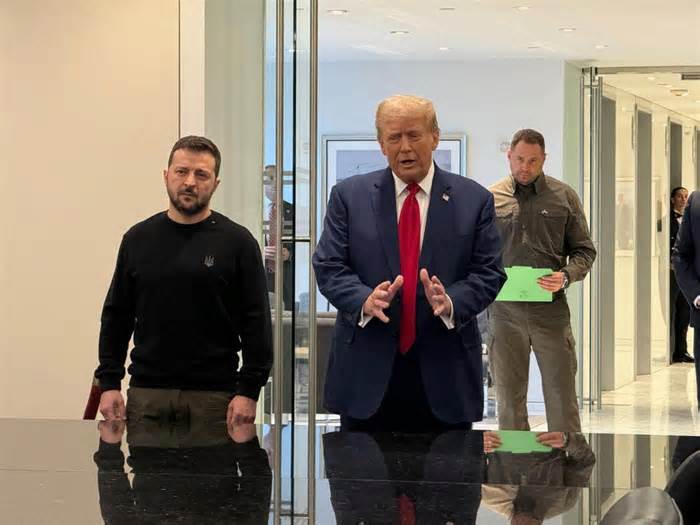Donald Trump did not end the war in Ukraine on the first day of his presidency, as he promised, yet he is still committed to “ending this ridiculous war. “The week of the hour, he discussed an imaginable deal for Ukraine’s rare earth minerals in exchange for help from the military, a concept that Ukrainian President Volodymyr Zelensky had floated before. J. D. Vance will make his first vacation in Europe as vice president this week, avoiding Paris for an AI summit, and then attending the Munich security conference where Ukraine will appear prominently. The upcoming anniversary of Vladimir Putin’s invasion on February 24, 2022, turns out to be the right time to take the pulse of Americans and Europeans in the war.
As always, it is important to put American attitudes in context. Americans have long been of two minds about international involvement. We are aware that as a global power we must play a significant role, and at the same time, we are tired of disproportionately bearing global burdens and concerned about problems at home. These contrasting attitudes wax and wane depending on many things including economic concerns, presidential leadership, and increasingly, partisan cues.
Last summer, the Chicago Global Affairs Council reported that 56% said they were the most productive for the long career of the United States to play an active role in global affairs, an answer in the back of its 50 years. In 2023, the Republican Party to an active role fell below 50% for the first time, however, higher up to 54% in 2024. The University of Marquette’s law requested a similar consultation in December and discovered that 60% were looking for the United States to take an asset that separates from global affairs and 40% remains outside. The ambivalent internationalism of Americans is evident in the effects of a new Reuters / Ipsos survey, where 48% have agreed that “Ukraine disorders are not our business and we deserve not to interfere”, and 48% disagree.
In Gallup’s December poll, 50% favored trying to end the conflict as quickly as possible even if it means allowing Russia to keep territory it has captured, while 48% wanted to support Ukraine in reclaiming territory even if it results in a more prolonged conflict between the two nations. The 50% “ending the conflict as quickly as possible” response was the highest since the question was first asked in 2022, when 31% answered that way. The new Suffolk University/USA Today poll found 50% favored reducing military aid and pushing for a negotiated settlement, with 44% opposed.
In the Marquette survey, 42% of the idea provided too much for Ukraine, 34% in the right amount, and 25% not enough. The reaction “too much” update of the construction through 10 issues since November 2022. On an economist/YouGov ballot since the end of January, 27% favored building on army aid to Ukraine, 28% maintain it asarray and 25% downplayed it.
With respect to Europe, the European Foreign Council council reported in May that “war support remained solid in (15) European countries surveyed. ” The majorities or pluralities forged in the highest European countries have said that it is an intelligent concept to build the source of ammunition and arms supplies. At the same time, the vote discovered an apartment between Ukraine and other European nations for the objective of additional aid. Europeans sought more assistance to put Ukraine in a greater negotiation position to succeed in an agreement. Ukrainians, questioned for the first time in this Ballotarrray Ecfer searched after weapons to win the war. “The predominant opinion in the maximum countries (with the exception of Estonia) is that the clash will end with a commitment agreement,” wrote the authors From the report, “the reports wrote the Europeans do not seem that Ukraine can win.
There were deep internal divisions in several countries. Take one, 75% of AFD supporters in Germany were looking for after pressuring Ukraine to negotiate a peace deal. Only 37% of the classic supporters of the CDU/CSU gave this answer. In some other domain involved the United States, only in Poland does it favor the greater defense spending of its country in view of the war.
In an upcoming survey after Trump’s elections, 48% in the countries of the EU Ucranalay in the United Kingdom were similar. In the survey, the opinion among the Ukrainians had changed. In May, 58% of Ukrainians said the probable result is the winner of Ukraine and 30% of a commitment regulation. In the new survey, those responses were 34% and 47% respectively.
While we are entering the fourth year of the conflict, it is not unexpected that public opinion in the United States and Europe has changed. American help for Zelensky and other Ukrainian people is strong, just like antipathy towards Putin. Americans need an intelligent solution for Ukraine, and would like to see the movement. No one deserves to underestimate difficulties.

